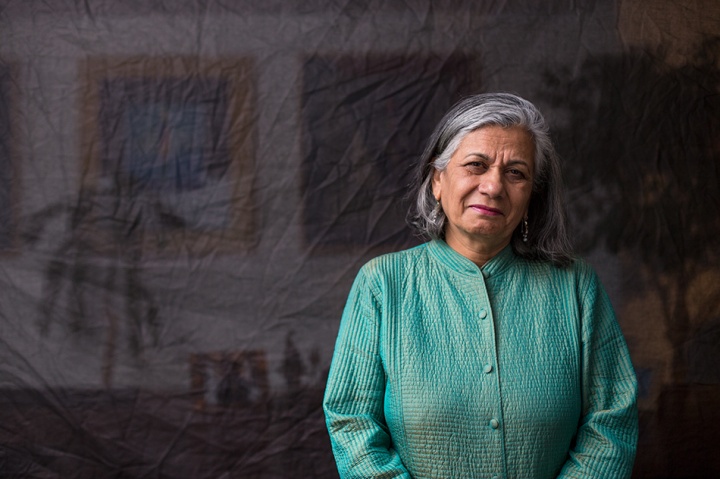
A Citizen’s Tool for Refugee Resettlement: Canada’s Refugee Sponsorship Program
Published onBy Ratna Omidvar, Executive Director of the Global Diversity Exchange
It is now four years since protests began gaining momentum in Syria. The Civil War has evolved into an international battle. The longer the fighting goes on, the more people there are turning their backs on their homes and crossing any border to find peace, stability, health, friends, family, and work.
The statistician Hans Rosling explained in a new Gapminder video where exactly the 12 million Syrians who left their homes are now located. Some eight million remain in Syria, and four million are refugees outside Syria who are registered with the United Nations Refugee Agency. Of this almost unimaginable number of displaced people, a fragment has made it to the European Union to apply for asylum: 250,000 are in the EU, but that’s only two per cent of the total number of people the conflict has displaced inside and outside Syria.
The world has not witnessed this scale of displacement by conflict since the Second World War. That wave of human migration redefined the world in important ways. It moved ideas, values and skills along with people. In the post-war years after 1945, some people made their way back. But many millions did not, even when it was possible to return. Too much had changed, geographically and politically, but also individually and emotionally.
The number of people fleeing Syria is projected to rise. Neighbouring countries Turkey, Jordan, Lebanon and Egypt are doing the heavy lifting, receiving the majority of Syrians, but living conditions for the refugees are not good and services are strained.
These Syrians need a permanent new home. The question is not “if,” but “where, when, and how.” The Global Diversity Exchange has made its niche in practical solutions, so let me focus on the “how.”
Canada’s Private Sponsorship of Refugees Program
In the wake of the Vietnam War, when Vietnamese became known as the “boat people” in their desperate efforts to escape the Communist dictatorship, the Canadian government decided to try a new approach to bringing refugees to Canada.
In 1979, Canada’s new minister of immigration, Ron Atkey, set a target of 12,000 refugees from Indochina (Vietnam, Laos and Cambodia). Apart from the sheer size of this commitment, the policy innovation was splitting the sponsorship between government and private citizens. The Canadian government would sponsor 8,000 refugees, and the private sector would be responsible for 4,000. Less than a year later, Canada increased its commitment with 21,000 more government spots, to be matched by 21,000 more private sponsorships. The matching principle kept nudging the figures up. By 1980, individual Canadians had formed 30,000 sponsorships, for a combined total of 60,000 refugees.
The forces behind the creation of the Private Sponsorship of Refugees (PSR) Program are numerous and difficult to put a finger on. It was the times, it was the war, it was the media, and of course, it was political leadership. In the words of Howard Adelmann, a retired professor and founder of a grassroots initiative to rally sponsors named Operation Lifeline, “Humanitarianism seemed to captivate the political imagination.”
And it was the generosity and commitment of ordinary Canadians. In the decades since the program’s birth, the energy and resources of the private sector have brought thousands of refugees to Canada each year.
Canada’s PSR program is the only one of its kind in the world, a story of Canadian exceptionalism. It allows private citizens to play a part in refugee resettlement. No citizens of any other country are enabled to step forward in this way. Indeed, both Canadian citizens and permanent residents can participate.
Friends, Family, Neighbours
A sponsorship typically begins when a group of friends, family, neighbours or colleagues get together and decide they want to be sponsors. This group may already know someone who is a refugee, and in this case, the PSR program allows them to bring the “named” refugee who may be a relative or friend of someone in Canada. But often, a sponsoring group will work to bring a refugee who is a complete stranger.
Becoming a sponsor involves a contract with the Canadian government. Sponsors commit to providing emotional, material and financial support for one full year. Sponsors must provide essentials like a house or rent, groceries, utilities, clothing, and furniture. They help the newcomers navigate public transit, government offices, and banks. They help find schools, doctors, dentists, interpreters, friends, and jobs. They perform a million acts of kindness large and small, from babysitting, to making meals, to mentoring, to taking calls in the middle of the night. All this is a commitment of time and money.
The beauty of the program is that relationships between sponsors and sponsored refugees commonly develop into deep and lasting friendships. A great many sponsoring groups are repeat sponsors, because there is little that competes with the fulfilment of supporting a family make a new life as Canadians. We are, after all, a nation of immigrants and refugees. Stories of flight and freedom are sewn deeply into the Canadian narrative.
Partly because of the personal relationships it generates, the PSR program is an effective tool for settlement. One of the best indicators of successful settlement is employment, measured by earnings. Research shows refugees who are privately sponsored have better employment outcomes than those who are sponsored by government or who claim asylum in Canada. In the first two years after arrival, privately sponsored refugees in Canada earned or exceeded a salary of $20,000, higher than any other refugee group. Their higher earnings hold over time.
Several researchers point to the social capital involved in private sponsorship to explain the divergent incomes. Private sponsors are ready-made champions in the refugees’ job search, motivated to help them land that first position. Some sponsors will pre-arrange employment too.
Adapting a Winning Idea to Your Context
Private sponsorship is a policy innovation worth looking at. It should never be conceived as the only response to the global refugee crisis. However, it’s a valuable addition to the tools available to nation states. It’s easily adapted. It is by definition consensual. It’s practical. It invites ordinary citizens to respond to harrowing political events outside their country with empathy and to engage directly in the business of being a good citizen. It’s about nation-building.
From Nation-Building to City-Building
In Toronto, GDX is supporting a new campaign to bring 1000 Syrian refugees to Canada through the PSR program, inviting ordinary citizens to step up to the plate. Lifeline Syria is building on the success of the earlier Operation Lifeline. With the support of local settlement agencies, churches, temples, refugee services and city and provincial government champions, Lifeline Syria is adapting a winning formula to a new and pressing reality.
Begin with a pilot. Focus on the Syrian refugee crisis for the test run. The uptake by private sponsors, their generosity and ownership, may surprise you.
When good ideas travel, they usually have to change for a new legal or social context. Lift from what works for your country context. For a beginner level of engagement of the private sector, one option is to develop a private sponsorship scheme for post-arrival support. Such a scheme could cut the involvement of sponsors in the selection process, but retain the sponsor-refugee matching that is so critical for settlement.
Whatever the scheme, keep a contract (formal or informal) between citizens and government. The success of the PSR program is in the collaboration between public and private, the dependency of one for the other, and the shared stake in the success of refugee families.
Details on Canada’s PSR program can be found online, in a guide for private sponsors, or a Canada chapter for the UNHCR on resettlement. Beg, borrow and steal.
At its core, private sponsorship is a mechanism to bridge newcomer and receiving community. One that embeds into immigration the principles of living together – of relationships, support, trust, and welcome.
About Lifeline Syria
Lifeline Syria will recruit, train and assist sponsor groups to welcome and support Syrian families establish homes safely and securely in Canada. Further information can be found at www.lifelinesyria.ca.
[Ratna Omidvar photographed by Ryan Walker]






